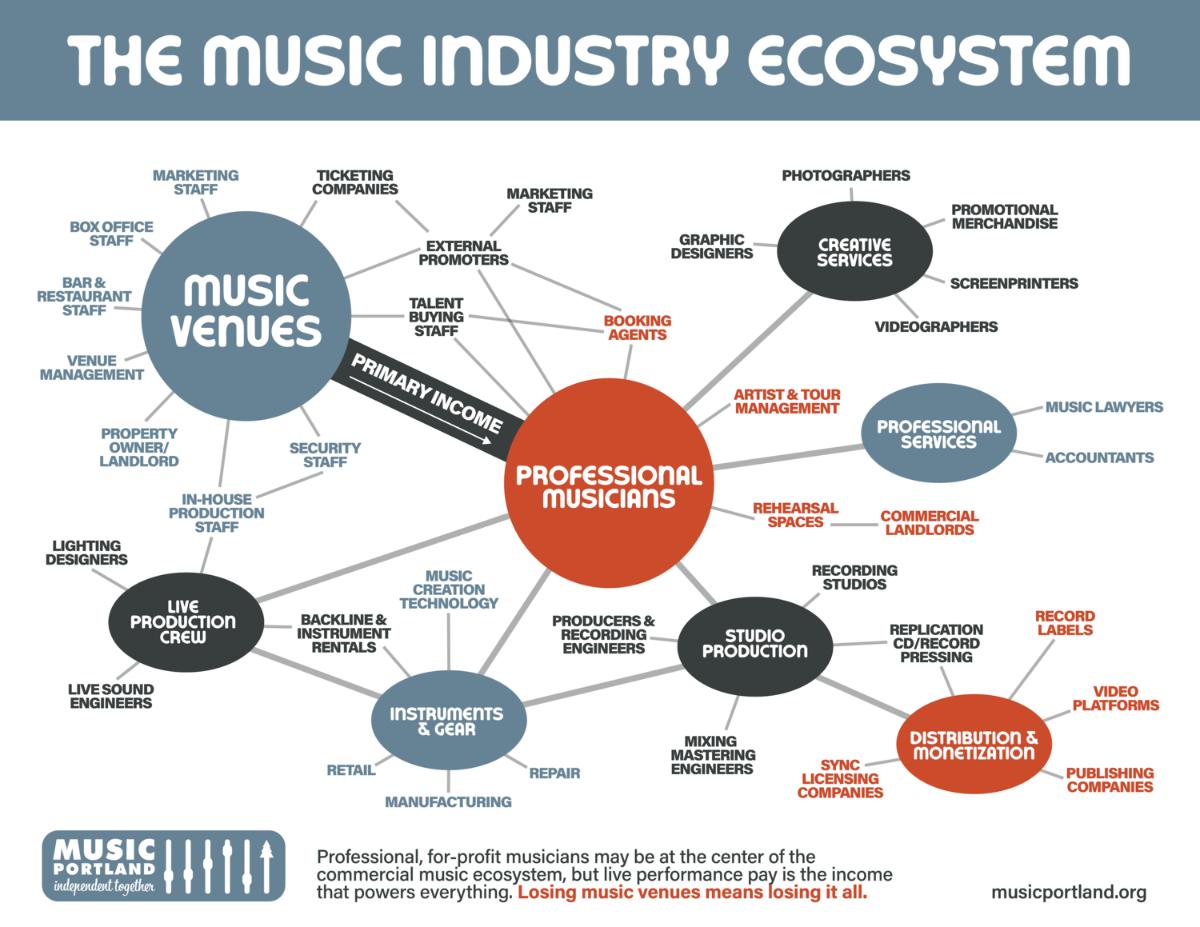The music industry is a vast and complex ecosystem, traditionally dominated by established players. From melody conception to global release, a song’s journey involves numerous companies, each playing a crucial role. Let’s explore this traditional landscape and contrast it with the burgeoning Music NFT market.
Table Content:
 Structure of the traditional music market. Source: Music Portland.
Structure of the traditional music market. Source: Music Portland.
The Traditional Music Ecosystem
The traditional music market relies on a complex interplay of various entities:
- Music Publishers: These companies hold the intellectual property rights to musical compositions, including lyrics and melodies. They license usage and collect royalties.
- Record Labels: Responsible for recording, producing, and distributing music. They often handle video production, marketing, and artist promotion.
- Artist Management Companies: These represent artists, guiding their careers, negotiating contracts, and coordinating musical activities.
- Music Distributors: They distribute and promote recordings and albums to online platforms, physical stores, and broadcast media.
- Audio Service Companies: These provide audio-related products and services, including stage and studio sound systems, recording equipment, and mixing consoles.
- Concert Promoters: They organize live performances and music events, bringing artists to audiences and managing production, promotion, and ticketing.
The Emerging Music NFT Market
In stark contrast to the established traditional market, the Music NFT market is still in its nascent stages, characterized by:
- Limited Projects: The number of active Music NFT projects remains relatively low, with fewer than 30 having significant impact.
- Multi-Purpose Marketplaces: Most existing Music NFT platforms handle various NFT types, including images, videos, and GIFs, rather than specializing solely in music.
- Lack of Diversity: The Music NFT ecosystem lacks the diverse range of companies seen in the traditional market and hasn’t formed specialized stacks like those found in DeFi.
This nascent state is understandable given that:
- Niche within a Niche: Music NFTs represent a small segment within the broader NFT space. As the overall NFT market matures, resources will naturally flow to more specialized areas like music.
- One-Way Value Flow: Unlike tokens, which often have bi-directional utility (e.g., governance, staking), Music NFTs primarily facilitate a one-way transaction from creator to consumer or investor.
For a deeper dive into the concept, benefits, and limitations of Music NFTs, refer to this article.
 Overview of the Music NFT market. Source: NFT Now.
Overview of the Music NFT market. Source: NFT Now.
Categorizing Music NFT Projects
Music NFT projects can be broadly categorized into two groups:
- Core Music NFT Projects: These focus on creating or utilizing Music NFTs, including creation tools, marketplaces, and investment platforms.
- Satellite Projects: These support the Music NFT market indirectly through social media platforms, ticketing services, fan clubs, and artist-related collectible NFTs.
However, satellite projects often serve multiple industries and don’t primarily focus on Music NFTs. This analysis will concentrate on core Music NFT applications specifically designed for music, excluding other NFT types.
For instance, OpenSea, a leading NFT marketplace, supports various NFT formats, including music. However, its lack of music specialization has allowed other platforms to gain prominence in this niche.

Active Music NFT projects can be further classified into the following categories:
- Music NFT Creation Tools: Platforms providing tools for artists and producers to create Music NFTs from their work.
- Music NFT Publishing: Projects focusing on releasing Music NFTs from artists’ works, often in limited or unlimited editions.
- Music NFT Marketplaces: Platforms facilitating the buying and selling of Music NFTs between users, ensuring secure and transparent transactions.
- Music NFT Investing/Copyrights Selling: Projects attracting investors to Music NFTs, offering ownership of unique musical works and potential profit through trading.
- Music NFT Streaming: Platforms enabling users to stream music associated with Music NFTs without necessarily owning them.
- Music NFT Mortgage: Projects developing functionalities for using Music NFTs as collateral for loans or other financial transactions.
Prominent Music NFT Projects
The following projects operate within the Music NFT market and meet specific criteria:
- Focus exclusively on Music NFTs.
- Function as core Music NFT applications (creation, publishing, or trading).
- Have a launched product and active users.
- Maintain a Twitter following of at least 10,000.
These criteria don’t guarantee long-term success but help filter out smaller, less established projects.
 Comparison of Music NFT projects
Comparison of Music NFT projects
(Detailed descriptions of Audius, Emanate, Rocki, Sound.xyz, Royal.io, Opulous, Corite, Catalog, Async, Arpeggi Labs, and SoundMint are included here, mirroring the original content with enhanced English and SEO optimization.) These descriptions will include the original images and appropriately crafted alt text for each image.
Conclusion
Music NFT projects are evolving to empower musicians, producers, and rights holders through blockchain technology. These platforms offer innovative tools for collaboration, distribution, and monetization, representing a significant shift in the music industry landscape. While still early, the Music NFT market holds considerable potential to reshape how artists control their work and build their brands.


